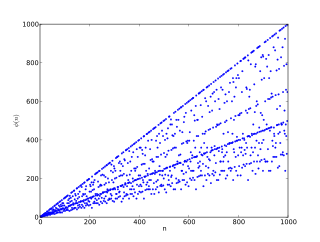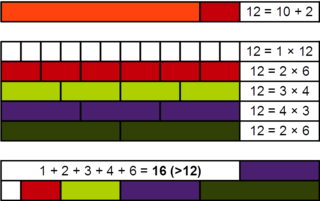
Amicable numbers are two different natural numbers related in such a way that the sum of the proper divisors of each is equal to the other number. That is, s(a)=b and s(b)=a, where s(n)=σ(n)-n is equal to the sum of positive divisors of n except n itself (see also divisor function).
The Möbius function μ(n) is a multiplicative function in number theory introduced by the German mathematician August Ferdinand Möbius (also transliterated Moebius) in 1832. It is ubiquitous in elementary and analytic number theory and most often appears as part of its namesake the Möbius inversion formula. Following work of Gian-Carlo Rota in the 1960s, generalizations of the Möbius function were introduced into combinatorics, and are similarly denoted μ(x).

In number theory, a perfect number is a positive integer that is equal to the sum of its positive divisors, excluding the number itself. For instance, 6 has divisors 1, 2 and 3, and 1 + 2 + 3 = 6, so 6 is a perfect number.

In number theory, Euler's totient function counts the positive integers up to a given integer n that are relatively prime to n. It is written using the Greek letter phi as or , and may also be called Euler's phi function. In other words, it is the number of integers k in the range 1 ≤ k ≤ n for which the greatest common divisor gcd(n, k) is equal to 1. The integers k of this form are sometimes referred to as totatives of n.
A highly composite number is a positive integer with more divisors than any smaller positive integer has. A related concept is that of a largely composite number, a positive integer which has at least as many divisors as any smaller positive integer. The name can be somewhat misleading, as the first two highly composite numbers are not actually composite numbers; however, all further terms are.

In mathematics, a multiply perfect number is a generalization of a perfect number.

In number theory, an abundant number or excessive number is a positive integer for which the sum of its proper divisors is greater than the number. The integer 12 is the first abundant number. Its proper divisors are 1, 2, 3, 4 and 6 for a total of 16. The amount by which the sum exceeds the number is the abundance. The number 12 has an abundance of 4, for example.

In number theory, a deficient number or defective number is a positive integer n for which the sum of divisors of n is less than 2n. Equivalently, it is a number for which the sum of proper divisors is less than n. For example, the proper divisors of 8 are 1, 2, and 4, and their sum is less than 8, so 8 is deficient.
In mathematics, a quasiperfect number is a natural number n for which the sum of all its divisors (the divisor function σ(n)) is equal to 2n + 1. Equivalently, n is the sum of its non-trivial divisors (that is, its divisors excluding 1 and n). No quasiperfect numbers have been found so far.

In number theory, a semiperfect number or pseudoperfect number is a natural number n that is equal to the sum of all or some of its proper divisors. A semiperfect number that is equal to the sum of all its proper divisors is a perfect number.

In number theory, a weird number is a natural number that is abundant but not semiperfect. In other words, the sum of the proper divisors of the number is greater than the number, but no subset of those divisors sums to the number itself.

In mathematics, an almost perfect number (sometimes also called slightly defective or least deficientnumber) is a natural number n such that the sum of all divisors of n (the sum-of-divisors function σ(n)) is equal to 2n − 1, the sum of all proper divisors of n, s(n) = σ(n) − n, then being equal to n − 1. The only known almost perfect numbers are powers of 2 with non-negative exponents (sequence A000079 in the OEIS). Therefore the only known odd almost perfect number is 20 = 1, and the only known even almost perfect numbers are those of the form 2k for some positive integer k; however, it has not been shown that all almost perfect numbers are of this form. It is known that an odd almost perfect number greater than 1 would have at least six prime factors.
In number theory, a k-hyperperfect number is a natural number n for which the equality holds, where σ(n) is the divisor function (i.e., the sum of all positive divisors of n). A hyperperfect number is a k-hyperperfect number for some integer k. Hyperperfect numbers generalize perfect numbers, which are 1-hyperperfect.
In mathematics, a harmonic divisor number or Ore number is a positive integer whose divisors have a harmonic mean that is an integer. The first few harmonic divisor numbers are
In mathematics, an untouchable number is a positive integer that cannot be expressed as the sum of all the proper divisors of any positive integer. That is, these numbers are not in the image of the aliquot sum function. Their study goes back at least to Abu Mansur al-Baghdadi, who observed that both 2 and 5 are untouchable.
In mathematics, a natural number a is a unitary divisor of a number b if a is a divisor of b and if a and are coprime, having no common factor other than 1. Equivalently, a divisor a of b is a unitary divisor if and only if every prime factor of a has the same multiplicity in a as it has in b.
In number theory, a superperfect number is a positive integer n that satisfies
In number theory, a normal order of an arithmetic function is some simpler or better-understood function which "usually" takes the same or closely approximate values.
Betrothed numbers or quasi-amicable numbers are two positive integers such that the sum of the proper divisors of either number is one more than the value of the other number. In other words, (m, n) are a pair of betrothed numbers if s(m) = n + 1 and s(n) = m + 1, where s(n) is the aliquot sum of n: an equivalent condition is that σ(m) = σ(n) = m + n + 1, where σ denotes the sum-of-divisors function.
In mathematics, Lehmer's totient problem asks whether there is any composite number n such that Euler's totient function φ(n) divides n − 1. This is an unsolved problem.












